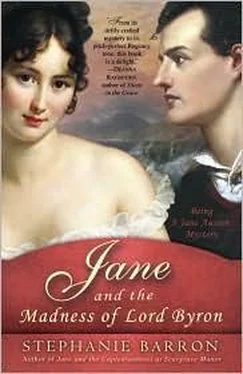The passage had commenced with a gradual descent, then leveled off—somewhere, I should judge, beneath the Steyne—and had now begun to steadily incline. Our tapers were almost burnt down; and their flames began to flicker in a gentle air that came from above.
“Presently we shall see where it ends, Jane,” Henry said with barely suppressed excitement.
The combined light of our dying flames revealed, of a sudden, a blank wall—made not of stone, but of wood planking. I glanced about, hoping to espy another staircase, twin to the one at the King’s Arms—but there was none to be seen. And at that instant, my taper went out.
Henry’s suffered a similar death within seconds.
The unfortunate thought of rats sprang unbidden to my mind, and I found that I had wrapped my skirts quite narrowly round my ankles once more, as a paltry defence against rodent teeth.
Fortunately, however, Young Bob’s candle—being made of good, honest, smoking tallow—was as yet in strength; and his spirits remained phlegmatic despite the featureless height of plank wall.
“This’ll be back of the New Stables, I’m thinking,” he said with confidence. “The Regent’ll have ordered the tunnel end walled up, when the Riding School and stalls was built; a few years ago the workings was done, and that’s why Tolliver was so sure as the tunnel was filled in.”
“But that cannot serve at all,” I replied in consternation.
Henry reached for my hand through the darkness and squeezed it in warning. There was no need, in truth, to share our suspicion that Miss Twining’s body had been carried into the Arms from the Pavilion. We were but visitors from London, after all, with a passion for publick-house oddities.
“You were not treated to Mr. Tolliver’s demonstration at the Arms,” I said, as conversationally as my fear of rats would allow, “and so did not witness the cunning shift in the panelling. There was a device—a carved dolphin—and when Mr. Tolliver pressed it, the tunnel opening sprang back. Perhaps there is a similar door here . If you would be so good as to raise your candle—”
Young Bob did so without demur.
Henry and I stepped forward, to push and press at every wormhole and whorl in the panelling; the publican’s man obligingly moved his candlelight some five feet one way, and a yard the other; our fingertips grew sore with excited vigour; and still the wall remained immoveable.
“You do not think, ma’am, as that track in the dirt bespeaks a sliding door?” Young Bob at length suggested doubtfully.
I glanced down. The candlelight, being raised almost to ceiling height, had left our feet in welling darkness. But it was as Young Bob said: when one studied the ground, one espied a grooved board laid beneath the panelled wall—as tho’ the entire thing was meant to slide back. Suppressing a most unladylike oath, I turned to Henry.
“Shine the light on the far corner,” he instructed.
Young Bob did so.
Henry ran his gloved fingers along the seam where planking met the perpendicular stone wall. “There is a peg, Jane—almost indistinguishable.”
He pulled it back; and the panel slid away from us, into a recess.
“Coo,” Young Bob observed with respect.
We were faced with row upon row of bottles, laid on racks a bare two feet from our noses. The tunnel came out into the Regent’s wine cellar.
“YOU APPREHEND,” I SAID TO MY BROTHER ONCE WE HAD returned the way we’d come, pressed a shilling into Young Bob’s work-hardened palm, and thanked the harassed Tolliver most prettily for our treat, “that only an intimate of the Regent’s could have used that passage Tuesday morning. Someone who knew that the tunnel existed—where it commenced, and where it led. There cannot be above five people in the Kingdom with such knowledge, and only two or three at present installed at the Pavilion.”
“Do not be hasty, Jane,” my brother said. “Consider of the fact that the Regent is a great talker—one who delights in conducting tours of the oddities of his home—and that there are any number of guests in years past—ladies as well as gentlemen—whom His Royal Highness might have made aware of the novelty of his secret sliding door.”
“George Hanger certainly knows of it,” I said grimly.
“But so, too, might Lord Moira, or Colonel McMahon—he has served the Prince for years, and as a trusted secretary, must be intimate with every corner of the Pavilion. A lifelong friend such as the Countess of Bessborough—Lady Caroline’s mother—who has been staying here forever, might well have glimpsed it. And then there are the servants—particularly the footmen charged with fetching the wine. For a fellow of the Regent’s appetites, and his vast generosity as a host, there cannot be too constant a replenishment of the wine stores. I should imagine those shelves are emptied once a month, at the very least—however immense the wine cellars may prove—and that in the course of stacking new bottles, the panel has been shifted.”
“Very well, Henry,” I said dubiously, “you have succeeded in turning me from the idea of exclusivity. The tunnel alone cannot entirely narrow our hunt for the murderer. But do admit that it goes a long way. We may suggest how Catherine Twining’s body was conveyed into the Arms, despite its doors being barred; and we may suggest , as well, that an intimate of the Pavilion—whether servant or guest—was vital to that body’s conveyance. Surely you will not quarrel with me there ?”
Henry considered of my logic for a moment. “I fear I cannot, Jane. But what is to be done?”
“You,” I said firmly, “must pay a call upon the magistrate—Sir Harding Cross—and inform him of what you know. From what I have observed of the gentleman, he is likely to take the word of a reputable banker—and an intimate of the Earl of Swithin—far more seriously than he should a mere spinster Jane Austen.”
Henry sighed. “There are moments when I find myself wishing for a solitary ramble along the Cobb at Lyme, Jane, as balm to a widower’s grief. Whatever made you so mad for Brighton this Season?”
Chapter 24 Ode to a Drowned Girl
THURSDAY, 13 MAY 1813
BRIGHTON, CONT.
THE RAIN HAD TAPERED TO A MIZZLE BY THE TIME WE quitted the King’s Arms. Henry and I were agreed upon the necessity of paying a call at No. 21, Marine Parade—he to solicit an introduction to Sir Harding Cross from the Earl of Swithin, and I to beg Desdemona for her intercession that evening with Brighton’s Master of Ceremonies, Mr. Forth. We hastened along the damp paving beneath Henry’s fortuitous umbrella, and were gratified in discovering the Swithins at home.
It was a fine family party that presented itself to our eyes: the Earl in his book room, surrounded by mellow bindings of calf, and a good fire against the chill; Desdemona at her tambour work, with her children—a son of five, and a daughter of seven—playing at spillikins on the drawing-room rug. Lady Oxford was seated at a writing desk, embarked on correspondence; and I was sorry to see all five rise up, and set aside their several pursuits, at our unexpected arrival. The children, indeed, were swept away by their nurse for hot milk and bread in their quarters; and I should imagine them fulminating darkly at the tiresomeness of unwanted callers, on a rainy afternoon.
Desdemona, however, was charming; declared that Henry and I had saved them all from insufferable boredom; and confided, in a whisper, as Lady Oxford tidied her writing things, that her friend had been longing to see me—had sent round to the Castle begging for just such a visit, only to discover we were gone out.
Читать дальше












